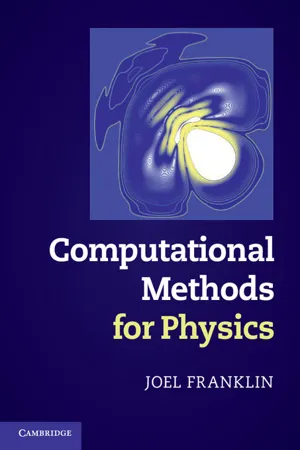Computational Methods for Physics
About this book
There is an increasing need for undergraduate students in physics to have a core set of computational tools. Most problems in physics benefit from numerical methods, and many of them resist analytical solution altogether. This textbook presents numerical techniques for solving familiar physical problems where a complete solution is inaccessible using traditional mathematical methods. The numerical techniques for solving the problems are clearly laid out, with a focus on the logic and applicability of the method. The same problems are revisited multiple times using different numerical techniques, so readers can easily compare the methods. The book features over 250 end-of-chapter exercises. A website hosted by the author features a complete set of programs used to generate the examples and figures, which can be used as a starting point for further investigation. A link to this can be found at www.cambridge.org/9781107034303.
Tools to learn more effectively

Saving Books

Keyword Search

Annotating Text

Listen to it instead
Information
Table of contents
- Contents
- Preface
- 1 Programming overview
- 2 Ordinary differential equations
- 3 Root-finding
- 4 Partial differential equations
- 5 Time-dependent problems
- 6 Integration
- 7 Fourier transform
- 8 Harmonic oscillators
- 9 Matrix inversion
- 10 The eigenvalue problem
- 11 Iterative methods
- 12 Minimization
- 13 Chaos
- 14 Neural networks
- 15 Galerkin methods
- References
- Index
Frequently asked questions
- Essential is ideal for learners and professionals who enjoy exploring a wide range of subjects. Access the Essential Library with 800,000+ trusted titles and best-sellers across business, personal growth, and the humanities. Includes unlimited reading time and Standard Read Aloud voice.
- Complete: Perfect for advanced learners and researchers needing full, unrestricted access. Unlock 1.4M+ books across hundreds of subjects, including academic and specialized titles. The Complete Plan also includes advanced features like Premium Read Aloud and Research Assistant.
Please note we cannot support devices running on iOS 13 and Android 7 or earlier. Learn more about using the app
